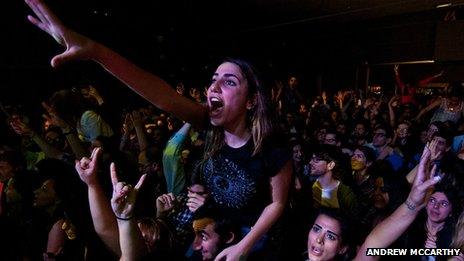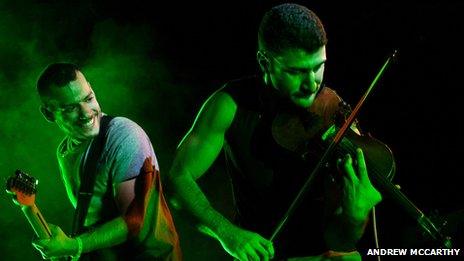Mashrou' Leila: The band out to occupy Arabic pop
- Published
The band's frontman Hamed Sinno spoke to the BBC about their work
Music has long been a vehicle for protest and dissent, but the Middle East's popular music scene has been accused of being staid and formulaic.
Now a Lebanese band with an eclectic sound, an openly gay frontman and politically charged lyrics is trying to tear up the conventions of Arabic pop culture.
"This next song is about really good sex," lead singer and lyricist Hamed Sinno announces part way through the debut London gig for Lebanese indie outfit Mashrou' Leila.
It is hard to imagine many other contemporary Arab musicians introducing a track with quite this frankness.
But it gets an enthusiastic reception from the febrile crowd as Sinno launches into Ala Babu (At His Door) - a song about desire, but also about longing and loss, explicitly addressed to another man, as many of the band's love songs are.
It is just this willingness to broach topics that few other Arab pop musicians have explored - homosexuality, emigration, politics, Beirut checkpoints and everything in between - that has brought Mashrou' Leila a loyal following in Lebanon and beyond.
And it is that following that has made it possible for them to distribute their latest album Raasuk, due out in November.
The band are not signed to a record label as they feel a label would want to "mould us into something that's easier to market in the Middle East than we are", Sinno explains.
So instead the band turned to "crowd funding", appealing for support from the fans using the Twitter hashtag #occupyarabpop, external in order to achieve "the biggest independent music release the Arab world has seen". They raised $66,000 (£43,400) in a matter of weeks.
Raasuk is another serving of the unique, musically omnivorous sound that made their first two albums a success in Lebanon, with influences numbering rock, jazz, electro and the Arab tradition of tarab fusing into an unmistakable whole.
And listening to the album's lyrics, you can hear why their music has connected with so many young people in the region.

The band had to add a second London date on their tour after the first sold out
'Still standing'
On one track, Wa Nueid (And We Repeat), on top of a crescendo from violinist Haig Papazian, Sinno defiantly sings verses that could have been taken from the protests of the Arab Spring:
"We can shake the cage we found ourselves in, until it collapses. Tell me, what are we are afraid of?
"We can resist until the nightmare that we fought dies. Tell them we are still standing."
The frustrations of young people in Lebanon, shared by many across the Arab world, have been one of Mashrou' Leila's recurring lyrical themes since being formed in in 2008 by Sinno and six fellow students at the American University of Beirut (AUB).
They comprise: classically-trained Papazian; drummer Carl Gerges; keyboard player Omaya Malaeb; guitarists Andre Chedid and Firas Abou Fakher; and bassist Ibrahim Badr.
The band's name is a pun in Arabic, translating either as Leila's Project or A Night Project, a nod to the band's origins in evening workshops crammed in around their studies.
Wa Nueid was originally meant to be a love song, Sinno explains, but politics intervened with an explosion in Beirut's Sassine Square and continuing upheaval in Egypt.
He decided to rewrite it, and another track on the album, Lil Watan (For The Nation).
"I was looking at the different reactions to what was happening in Lebanon and in other places in the Arab world and it was very inspiring for me.
"For the first time I felt like I belonged to something, a larger movement that's happening across the region."
But even before the upheavals of the past two years, Mashrou' Leila has been taking its message to those in high places - sometimes at unexpectedly close quarters.
When the band headlined Lebanon's prestigious Byblos Festival in 2010, the then-Prime Minister Saad Hariri happened to be in the crowd.
Not only did they not tone down any of their act, Sinno took the opportunity to address one of their tracks, 'Al Hajiz (At The Checkpoint), to Mr Hariri.
The expletive-laden song recounts the frustrating experience of many Beirutis at the hands of overbearing guards at security checkpoints in the streets around the homes of the great and good.
"I live right across the road from him. So before we played that song I pointed out that this was because of him, and what his people do to me on a daily basis, and how absurd I thought that was," Sinno recalls.
"That might have ticked a few people off."

Abou Fakher and Papazian, two of Mashrou' Leila's "musical omnivores"
No going back
Mashrou' Leila are also broaching new ground for Arab music with their honesty about sex and sexuality.
Sinno is one of the few public figures in the Arab world to be openly gay and to discuss his sexuality.
Lebanon has a reputation as being one of the region's more liberal countries in regards to its treatment of sexual minorities, playing host to the Arab world's first gay rights organisation, Helem. Even so, gay people can still be prosecuted under a law banning "sexual intercourse contrary to nature".

Sinno was on the cover of French gay magazine Tetu before their Paris gig
Did Sinno ever hesitate about being open with regards to his sexuality when the band started gaining a public profile?
"I've been out since before the band. I don't think it actually matters whether or not I'm gay but at the same time it's always been an issue for me that I think there should be more out public figures in the Middle East at this point," he says.
While growing up, the lack of public figures to identify with was "alienating", Sinno says.
"That's the part that's really scary about being queer and young, is that you're alone." It is this that he hopes to help change for young Arabs.
But even in relatively liberal Lebanon, Sinno says he is acutely aware that some gay people - normally those who are working-class and without the protection that money can afford - are still sometimes targeted by the authorities.
In some high-profile recent cases, Lebanese police have raided establishments frequented by gay men and subjecting them to procedures including anal examinations, denounced as "rape" by Helem.
Sinno admits he is still worried that his visibility as a public figure could one day work against him.
He points to the example of Canadians Dr Tarek Loubani and filmmaker John Greyson, held by Egyptian authorities for seven weeks without charge, as an example of what can happen to those who fall foul of authority.
"These people had all sorts of international support, people behind them rallying - literally - across the globe. And it took this long to release them.
"No-one actually wants to be incarcerated. But I don't think that's enough of a reason to take back any of my positions on anything."
- Published4 August 2012
- Published13 July 2012
- Published8 August 2012